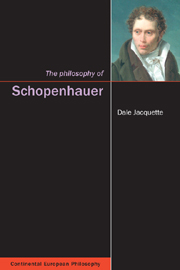Book contents
- Frontmatter
- Contents
- Dedication
- Preface
- Acknowledgements
- A note on texts and terminology
- Abbreviations
- Introduction: Schopenhauer's life and times
- 1 Schopenhauer's idealism
- 2 Empirical knowledge of the world as representation: from natural science to transcendental metaphysics
- 3 Willing and the world as Will
- 4 Suffering, salvation, death, and renunciation of the will to life
- 5 Art and aesthetics of the beautiful and sublime
- 6 Transcendental freedom of Will
- 7 Compassion as the philosophical foundation of morality
- 8 Schopenhauer's legacy in the philosophy of Nietzsche, Heidegger and the early Wittgenstein
- Notes
- Bibliography and recommended reading
- Index
1 - Schopenhauer's idealism
- Frontmatter
- Contents
- Dedication
- Preface
- Acknowledgements
- A note on texts and terminology
- Abbreviations
- Introduction: Schopenhauer's life and times
- 1 Schopenhauer's idealism
- 2 Empirical knowledge of the world as representation: from natural science to transcendental metaphysics
- 3 Willing and the world as Will
- 4 Suffering, salvation, death, and renunciation of the will to life
- 5 Art and aesthetics of the beautiful and sublime
- 6 Transcendental freedom of Will
- 7 Compassion as the philosophical foundation of morality
- 8 Schopenhauer's legacy in the philosophy of Nietzsche, Heidegger and the early Wittgenstein
- Notes
- Bibliography and recommended reading
- Index
Summary
Accordingly, true philosophy must at all costs be idealistic; indeed, it must be so merely to be honest … It is quite appropriate to the empirical standpoint of all the other sciences to assume the objective world as positively and actually existing; it is not appropriate to the standpoint of philosophy, which has to go back to what is primary and original. Consciousness alone is immediately given, hence the basis of philosophy is limited to the facts of consciousness; in other words, philosophy is essentially idealistic.
(WWR 2: 4–5)A world in thought
To open the first pages of Schopenhauer's treatise The World as Will and Representation is to encounter an outrageous view of reality. We may easily be stunned into a sense of incredulity. Can Schopenhauer really be saying such things? Does he literally mean that the world of physical objects exists only in the mind?
Schopenhauer tells us in no uncertain terms that the world we experience in sensation exists entirely in thought, that everyone on reflection already knows this and that the world begins with the awakening to consciousness of each individual mind and ends with each thinking being's death. The implications of this radical commitment to the physical world's mind-dependence are as astonishing as they are intriguing. To understand Schopenhauer's metaphysics and epistemology with all their implications requires that we first try to make sense of his extreme idealism.
- Type
- Chapter
- Information
- The Philosophy of Schopenhauer , pp. 11 - 39Publisher: Acumen PublishingPrint publication year: 2005



